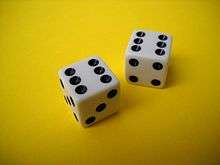fullam
See also: Fullam
English

Two dice, both landing high on six.
Alternative forms
- fullan, fullom, fulham
Etymology
From Fulham, a London suburb, which during the reign of Queen Elizabeth I was the most notorious place for blacklegs in all of England. Loaded dice were supposed to have been chiefly made there.
Pronunciation
- IPA(key): /ˈfʊləm/
- Hyphenation: ful‧lam
- Homophone: Fulham
- Rhymes: -ʊləm
Noun
fullam (plural fullam or fullams)
- (archaic, Britain, slang) A false die; a die intentionally loaded, or unevenly weighted, so that it always rolls a specific number.
- 1594, Nashe, Thomas, The Unfortunate Traveller:
- Captaine, you perceiue how neere both of vs are driuen, the dice of late are growen as melancholy as a dog, high men and low men both prosper alike, langrets, fullams, and all the whole fellowshippe of them will not affoord a man his dinner, some other means must be inuented to preuent imminent extremitie.
- a. 1597, Shakespeare, William, The Merry Wives of Windsor, Act 1, Scene 3:
- Let vultures gripe thy guts! For gourd and fullam holds / And high and low beguiles the rich and poor.
- 1599, Jonson, Ben, Every Man out of His Humour, Act 3, Scene 1:
- Who! he serve? 'sblood, he keeps high men, and low-men, he! he has a fair living at Fullam.
-
- (archaic, Britain, colloquial, by extension) A sham; a hoax; a make-believe.
Synonyms
- (false die): gourd, langret, loaded dice (plural)
- (sham): see Thesaurus:deception
Hyponyms
This article is issued from
Wiktionary.
The text is licensed under Creative
Commons - Attribution - Sharealike.
Additional terms may apply for the media files.